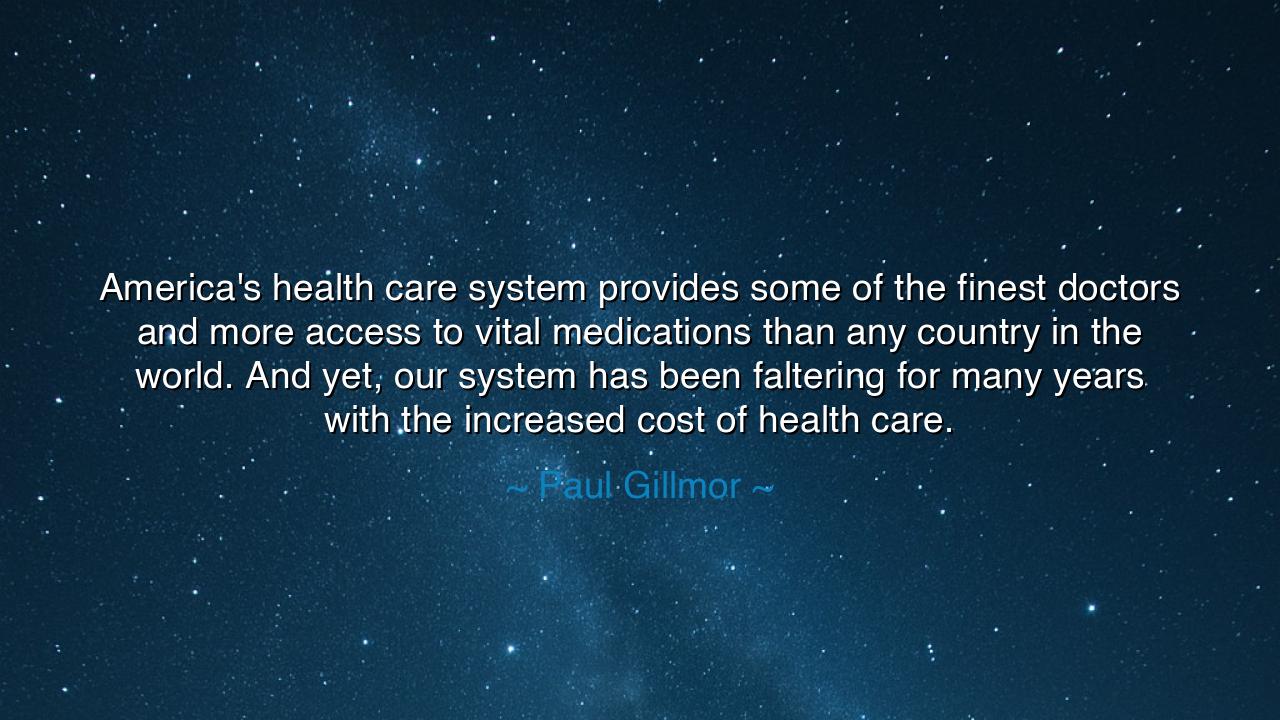
America's health care system provides some of the finest doctors
America's health care system provides some of the finest doctors and more access to vital medications than any country in the world. And yet, our system has been faltering for many years with the increased cost of health care.






In a time when the pulse of a nation beats unevenly between greatness and struggle, the American statesman Paul Gillmor spoke with sober clarity: “America's health care system provides some of the finest doctors and more access to vital medications than any country in the world. And yet, our system has been faltering for many years with the increased cost of health care.” These words are not merely political; they are prophetic. They speak to the paradox of abundance and fragility, of excellence burdened by excess. Gillmor, a servant of the people and a voice of reason in an era of rising complexity, saw that the nation’s strength in healing was shadowed by its inability to sustain that gift for all. His reflection stands as both a tribute and a warning — that even the most advanced system will decay if it forgets the purpose for which it was made: to serve life itself.
The origin of this quote lies in the heart of America’s long struggle to balance progress with equity. As a congressman in the late twentieth century, Gillmor witnessed an age of medical triumph — cures for diseases once thought incurable, technologies that extended life, and physicians whose skill rivaled that of the ancient healers of legend. Yet he also saw another truth: that the cost of health care, rising like an untamed tide, began to drown the very people it was meant to save. He spoke these words as both praise and lament — to honor the brilliance of American medicine while warning of the danger that prosperity, if unchecked by compassion, becomes a curse.
When Gillmor praises “the finest doctors” and “access to vital medications,” he acknowledges the nation’s mastery of healing arts. The United States has long been home to medical pioneers — those who dared to unravel the mysteries of the human body. It is the land where Dr. Jonas Salk conquered polio, where surgeons first dared to transplant hearts, where laboratories hum with the promise of life renewed. Yet even as this abundance of knowledge grew, so too did the walls around it. The poor, the elderly, the forgotten — many could see the temple of healing but could not enter it. Thus, Gillmor’s praise is intertwined with sorrow, for he sees that excellence without accessibility is but a mirror of injustice.
His warning that the system has been “faltering for many years” reveals the ancient truth that greatness untempered by humility will collapse under its own weight. Like the empires of old that fell not to invasion but to excess, the health system too became burdened by inefficiency, by greed, by the ever-growing machinery of bureaucracy. The healing art, once a sacred covenant between doctor and patient, began to bend beneath the weight of paperwork, policy, and profit. What was once a calling risked becoming a commodity. Gillmor’s voice, steady yet mournful, reminds us that a nation’s greatness is not measured by its wealth, but by how it tends to the weakest among its people.
Consider the story of Florence Nightingale, the “Lady with the Lamp,” who during the Crimean War transformed the meaning of care. Surrounded by suffering soldiers in filthy hospitals, she did not ask what was profitable — she asked what was right. With discipline, compassion, and courage, she rebuilt the foundations of modern nursing. Her light shone not through medicine alone, but through the spirit of service. Gillmor’s insight echoes that same eternal lesson: technology and talent may heal the body, but compassion alone heals the system. Without moral purpose, even the finest doctors labor in vain.
In speaking of the “increased cost of health care,” Gillmor touches on a wound that bleeds through the soul of modern civilization — the commodification of survival. What price can be set upon a heartbeat, or a child’s breath? Yet nations continue to struggle with this question. The tragedy is not that medicine costs, but that its cost is borne unequally — that the abundance of life-saving power is hoarded by the few while the many languish in fear of debt or disease. Gillmor’s words call upon us to remember that healing must not be a privilege of fortune, but a birthright of humanity.
So, O listener, take these words as both mirror and mandate. Be grateful for the brilliance of modern medicine — for the doctors who labor, the scientists who seek, the medications that sustain. But do not grow blind to the suffering that still lingers beneath their shadow. Advocate for fairness, for systems that balance excellence with empathy. Support those who bring healing not for profit but for purpose. Demand accountability where greed has taken root, and offer compassion where bureaucracy has turned cold.
The lesson of Paul Gillmor’s wisdom endures like the steady beat of a heart: that a nation’s true health is not measured by its hospitals or its wealth, but by the justice and mercy within its care. Let us, then, strive not only to cure disease but to heal the system itself — to make of medicine once more a covenant of trust, where the art of healing is guided not by the hand of profit, but by the pulse of humanity. For only when compassion and care walk hand in hand can a people truly call themselves well.






AAdministratorAdministrator
Welcome, honored guests. Please leave a comment, we will respond soon